Home Tags Posts tagged with "nicolas maduro"
nicolas maduro
Venezuela has announced the creation of a security unit to defend the country’s electrical system, a day after a blackout that affected 70% of the country.
Some rural areas are still experiencing power outages, reports say.
Energy minister Jesse Chacon apologized for the blackouts and congratulated Venezuelans for their calm despite the opposition’s “destabilizing efforts”.
Critics say the blackouts are due to a lack of investment in infrastructure.
Jesse Chacon said a metal grille had been tampered with and fell on electrical lines, causing a short circuit.
President Nicolas Maduro said the government would carry out an investigation, and a new security unit would be created to protect the electrical system from sabotage attempts.
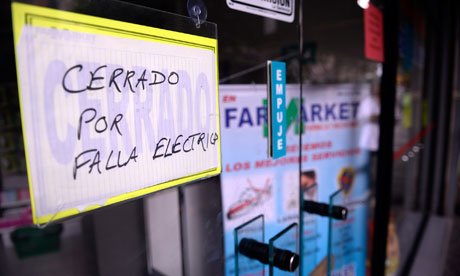
Venezuela has announced the creation of a security unit to defend the country’s electrical system
Officials say the system has been fully restored everywhere, but accounts on the social network Twitter suggest that the blackouts lasted much longer outside the capital, Caracas, reports Irene Caselli in Caracas.
One woman has told the Associated Press news agency she did not believe “this tale about sabotage”.
“We all know who is to blame,” said Adriana Montoya, a housewife who said she was stuck for hours in traffic jams that formed as traffic lights went dark in Caracas, which lost power for five hours on Tuesday.
The blackout also partially disrupted the underground transport system, with people being stuck in trains in tunnels before being evacuated to safety.
Thousands of workers were sent home.
Nicolas Maduro blamed the opposition for “sabotage” to power transmission lines.
The president did not give any evidence to support the accusation, but said he had instructed the military “to protect the entire country”.
Opposition leader Henrique Capriles said the government was trying to divert public attention from Venezuela’s problems by concocting a conspiracy theory.
[youtube h0K0pE8rf4Q]
A power blackout has left 70% of Venezuela without electricity, including parts of the capital Caracas.
The power cut disabled traffic lights in the city, causing traffic chaos. It also partially disrupted the underground transport system.
Thousands of workers were sent home. Power was slowly being restored in different areas after the cuts.
President Nicolas Maduro blamed the opposition for “sabotage” to power transmission lines.
“Everything seems to indicate that the extreme right has resumed its plan for an electrical strike against the country,” he said in a tweet.
In a live address on state television, the president also said the cuts were “part of a low-level war” against the country, a “folly by twisted and desperate minds”.
Nicolas Maduro did not give any evidence of the “sabotage” but said he had instructed the military “to protect the entire country”.
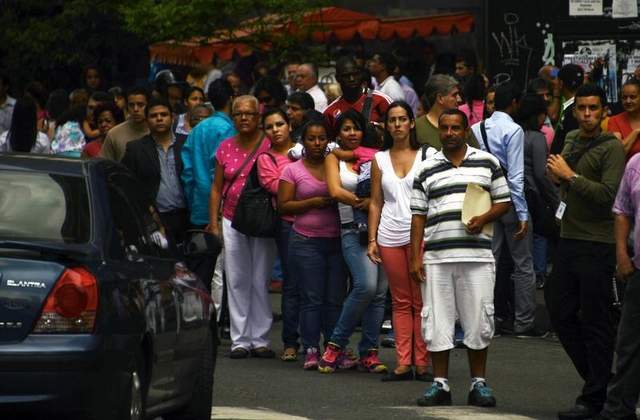
The power blackout has left 70 percent of Venezuela without electricity, including parts of the capital Caracas
Opposition leader Henrique Capriles said the government was trying to divert public attention from the country’s problems by concocting the conspiracy theory.
Deputy Electrical Energy Minister Franco Silva said a fault had occurred in one of the national grid’s main transmission lines on Tuesday at 12:30 local time.
The cut affected large parts of the country for about three hours, after which time power was gradually restored.
The oil industry was not affected as Venezuela’s oil refineries are powered by separate generator plants.
Government officials have in the past said that high energy consumption at peak times and poor maintenance of transmission lines have led to a high incidence of cuts.
In 2010 the late President Hugo Chavez signed a decree declaring an “electricity emergency” to help his government tackle power shortages.
The opposition says the government of Hugo Chavez and his successor, Nicolas Maduro, may have spent billions of dollars on programmes to garner votes from the poor but has failed to invest in the upkeep and expansion of the electrical grid to meet growing demand.
Although Venezuela has big oil reserves, it is dependent on hydro-electricity for some 70% of its power.
Power cuts are common in Venezuela, especially in the country’s interior states, but rarely affect the capital, Caracas.
[youtube yQ0_mOMyPis]
Venezuela’s President Nicolas Maduro has called on the police to act against gangs that are stealing women’s hair.
The thieves sell the hair – sometimes stolen at gunpoint – to salons where it is used for extensions and wigs.
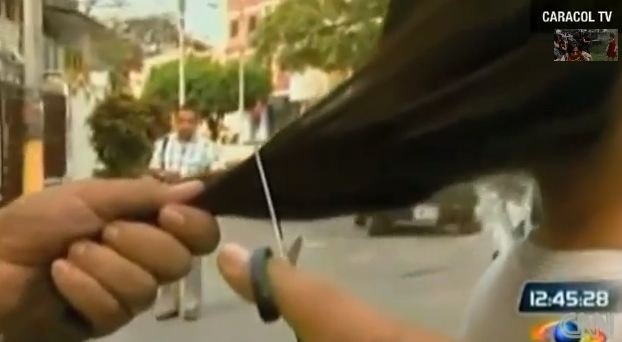
Venezuela’s President Nicolas Maduro has called on the police to act against gangs that are stealing women’s hair
Attacks appear to be on the rise, especially in the country’s second largest city Maracaibo, local media report.
Nicolas Maduro used strong language against what he called “mafias that cut girls’ hair”.
Speaking at the inauguration of a train station in the capital Caracas, he said the government would guarantee that the thieves would be caught.
Several women have reportedly been targeted, being asked to tie their hair into ponytails so that gang members can easily cut it off.
However, authorities are yet to receive any formal complaints.
One victim told a local newspaper that she refused to report the case to the police because she feared being teased.
[youtube 1Wapukr_md4]
Venezuela’s Supreme Court has rejected an appeal by opposition leader Henrique Capriles against April’s contested presidential election result.
The Supreme Court of Justice described the appeal as “inadmissible”.
After the ruling Henrique Capriles tweeted that there was a “lack of justice” in Venezuela.
Nicolas Maduro, Hugo Chavez’s handpicked successor, won the election by less than 1.5 percentage points – about 200,000 votes.
The opposition alleged that the vote had been marred by fraud.
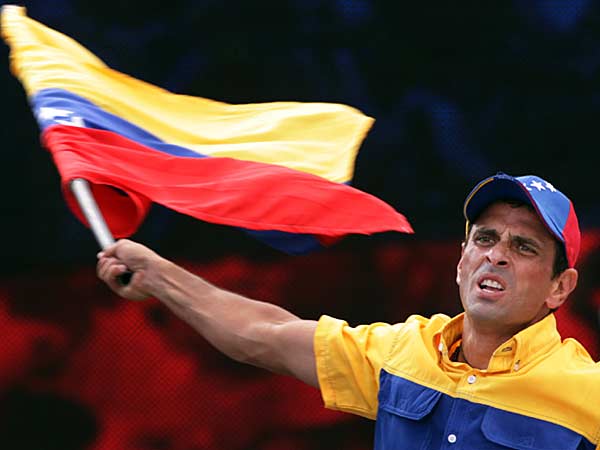
Venezuela’s Supreme Court has rejected Henrique Capriles’ appeal against April’s contested presidential election result
In June the Venezuelan National Electoral Commission (CNE) confirmed President Nicolas Maduro’s victory in an audit on millions of votes, but Henrique Capriles denounced the audit as “a fake”.
In her ruling on Wednesday, Justice Gladys Gutierrez said the opposition had not offered “sufficient proof” to back up their allegations.
The 10-point appeal had been lodged by Henrique Capriles, the opposition coalition and several citizens.
On Tuesday, Henrique Capriles criticized the court’s delay in making a ruling and said that he would take the case to “international bodies”.
April’s election was called after the death of Hugo Chavez on March 5 following a long battle against cancer.
[youtube P2dpfa1VSLg]
Venezuela is holding a week-long festivities honoring late Hugo Chavez’s birthday, almost five months since his death on March 5.
Hugo Chavez, who dominated Venezuela’s political scene from the moment he took office in 1999 to his death on March 5, would have turned 59 on Sunday.
President Nicolas Maduro is marking the occasion with public dances and concerts. He even plans to go house-to-house in some neighborhoods bearing gifts and a message from the “supreme comandante.”
Hugo Chavez’s legacy however has divided the country, with about half the population blaming him or Nicolas Maduro for the country’s miserable economy and sky-high crime rate.
Ground zero for the Chavez worship is the Cuartel de la Montana, an old fort on a Caracas hillside deep within a working-class pro-government neighborhood. Over the years it has housed a military academy, government offices, and a military museum.
Today it is also a mausoleum for the late leader, who died after a long battle with cancer that captivated the nation’s attention for months.
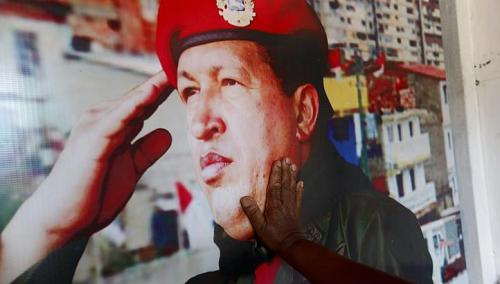
Venezuela is holding a week-long festivities honoring late Hugo Chavez’s birthday
Hugo Chavez’s marble sarcophagus is protected by an honor guard, and every day at 4:25 p.m. a cannon is fired to mark the moment he died.
Nicolas Maduro was at the Cuartel on Sunday, and surrounded by the most senior government and military officials he celebrated Hugo Chavez’s birthday by vowing to continue the late leader’s policies.
The self-declared “first Chavista president”, 50 year-old former bus driver Nicolas Maduro promised to battle crime and corruption, and urged Venezuelans to have faith in the government’s policies.
“There are two models: that of the stateless bourgeoisie and the Chavista and Bolivarian, but only one path – that which Chavez left us,” Nicolas Maduro concluded, amid a burst of fireworks and as musicians began to play Happy Birthday.
Just outside the Cuartel, at the crest of a hill of tightly-packed dwellings adorned with murals of Hugo Chavez, stands a small chapel with painted wood walls and tin roof that overflows with flowers and candles.
At the altar a poster of the “eternal comandante” is placed under a cross and next to a clay bust of the late leader.
Many Venezuelans are still adapting to the post-Chavez world, but as time goes by the shock of his death is giving way to the struggles of everyday life.
Many loyalists, or Chavistas, acknowledge that things are tough and support Nicolas Maduro – but others grumble that Maduro isn’t up to the task.
Critics say Hugo Chavez’s 14 years in power were a disaster, and point to Venezuela’s 25% inflation rate, the erratic availability of goods, and a hair-raising crime rate that resulted in 16,000 murders in 2012.
Henrique Capriles has been careful to avoid offending Hugo Chavez in public and has asked the government to let the late president “rest in peace”. But he has let loose on Nicolas Maduro, accusing him of using the image of his charismatic predecessor to “cover up the problems” of Venezuela – which he claims have worsened since Maduro took office.
[youtube 3ssit1Gbj2I]
Venezuela announces it has “ended” steps towards restoring diplomatic ties with the US, after comments made by Samantha Power, who was nominated as the next envoy to the UN.
Samantha Power said this week she would seek to combat what she called the “crackdown on civil society” in countries including Venezuela.
She was speaking at a US Senate confirmation hearing on Wednesday.
The remarks prompted an angry response from Venezuela’s President Nicolas Maduro.
“The Bolivarian Republic of Venezuela hereby ends the process… of finally normalizing our diplomatic relations,” said Venezuela’s foreign ministry in a statement.
It objected to Samantha Power’s “interventionist agenda”, noting that her “disrespectful opinions” were later endorsed by the state department, “contradicting in tone and in content” earlier statements by Secretary of State John Kerry.

Venezuela announces it has “ended” steps towards restoring diplomatic ties with the US, after comments made by Samantha Power
Relations between the US and Venezuela have been strained in recent years. They last had ambassadors in each other’s capitals in 2010.
Washington angered Caracas by backing the Venezuelan opposition’s demand for a full recount of the presidential election in April to replace Hugo Chavez, who died in March.
Hugo Chavez’s anointed successor, Nicolas Maduro, won the vote by less than two percentage points.
In June, the two countries had tentatively agreed to work towards improving their strained relations, after Venezuela freed and deported a US filmmaker who had been held on conspiracy charges.
During a regional summit in Guatemala, John Kerry said he had agreed with Foreign Minister Elias Jaua on an “ongoing, continuing dialogue” in order to “establish a more constructive and positive relationship”.
He said the US wanted to “begin to change the dialogue between our countries and hopefully quickly move the appointments of ambassadors between our nations”.
Elias Jaua said at the time that for Venezuela it was important to build a relationship based on the principles of mutual respect and no interference in internal affairs.
[youtube 6iJqF5R36E0]
According to a Russian politician, Edward Snowden has accepted an offer of political asylum from Venezuela.
Unofficial spokesman for the Kremlin Alexei Pushkov tweeted today that Edward Snowden, believed to be in Russia and wanted by the US authorities for leaking security secrets, is keen to take up the offer, AP reported.
The tweet was removed a few minutes after it was posted.
Soon after the tweet’s disappearance he sent another message saying his claim was based on a report from the state all-news television channel Vesti.
However, no such information could be found on Vesti’s website and no Russian news agency reported that Vesti had ever said it.
The TV channel could not immediately be reached for comment and the Kremlin declined comment on today’s developments.
Edward Snowden, 30, who revealed details of a US intelligence program to monitor internet activity, went to Moscow’s Sheremetyevo airport on June 23 and was believed to be headed for Cuba.
But he did not board that flight is believed to have been stranded in the airport’s transit lounge ever since.
Venezuelan President Nicolas Maduro had already offered asylum to Edward Snowden while Bolivia and Nicaragua said they too would grant asylum to the American fugitive.
Ecuador said it will consider any asylum request.
Nicolas Maduro said it is perhaps the world’s “first collective humanitarian asylum” with various countries saying: “Come here!”
But the United States has cancelled Edward Snowden’s passport and it is unclear if he has travel documents he would need to leave Moscow.

Edward Snowden has accepted an offer of political asylum from Venezuela
Nicolas Maduro said Edward Snowden “will have to decide when he flies here, if he finally wants to travel here”.
On Friday he said: “As head of state, the government of the Bolivarian Republic of Venezuela decided to offer humanitarian asylum to the young American Edward Snowden so that he can live (without) … persecution from the empire.”
Nicolas Maduro made the offer during a speech marking the anniversary of Venezuela’s independence. It was not immediately clear if there were any conditions to Venezuela’s offer.
“In the name of America’s dignity … I have decided to offer humanitarian asylum to Edward Snowden,” Nicolas Maduro proclaimed during a military parade marking the country’s Independence Day.
“He is a young man who has told the truth, in the spirit of rebellion, about the United States spying on the whole world,” Nicolas Maduro said.
But the Obama administration said yesterday that U.S. diplomats are working behind the scenes to make it difficult for Edward Snowden to find safe harbor in any of the nations that have offered him asylum.
Edward Snowden has received a temporary travel document to fly to Caracas, Venezuela, and both Bolivia and Nicaragua have also offered him political asylum, but White House Press Secretary Jay Carney told reporters during his regular briefing that the United States will do what it can to stop him.
“The United States has been in touch via diplomatic and law enforcement channels with countries through which Mr. Snowden might transit or which might serve as final destinations for Mr. Snowden,” Jay Carney said.
U.S. diplomats, he added, have “made very clear that he has been charged with a felony, or with felonies, and, as such, he should not be allowed to proceed in any further international travel other than travel that would result in him returning to the United States”.
It’s not clear whether the Obama administration is hoping a Latin American nation will double-cross Snowden and offer him up to Washington after he arrives from Russia.
But the U.S., Jay Carney said, is still working to persuade Moscow to short-circuit the process and turn the fugitive over before he can leave Moscow’s Sheremetyevo-2 airport.
Sources say Edward Snowden will not be allowed to board the only Aeroflot plane that offers direct connections to Caracas, a regular service to Cuban capital Havana.
The routing overflies both the EU and the US and there are fears the plane will be denied rights to Western airspace, and forced to land, leading to Edward Snowden’s arrest.
The direct distance from Moscow to Caracas is 6,175 miles but it appeared too far for Edward Snowden.
The escape route for Edward Snowden is fraught with problems.
With Russia getting publicly impatient with Edward Snowden’s presence in its transit zone, his escape route is a logistical nightmare.
“Instead of going west to Venezuela, his obvious option is east to Vladivostok and then across the Pacific to Caracas,” said one source.
It would mean Russia allowing him to formally enter its territory, which so far it has refused to do, unwilling to upset the US.
This would also involve a 14,200 mile detour and a routing that would bring him close to the US state of Hawaii posing a risk to any private plane willing to take him on a route where there are no scheduled services.
One option for the fugitive is to charter a private plane.
Former CIA analyst Allen Thomson said: “A private plane certainly looks like the best bet to me.”
“It has the advantage of simplicity and minimum involvement by the Russian government,” Mother Jones reported.
As Allen Thomson told Foreign Policy, Edward Snowden could avoid US-influenced airspace by flying north to the Barents Sea, through the Denmark Strait, head soutwhile avoiding Canada’s Newfoundland, until getting to the east of the Windward Islands, then squeezing through between islands.
[youtube IyZZl6sju3U]
Nicaragua and Venezuela have offered political asylum to US fugitive Edward Snowden.
Venezuela’s President Nicolas Maduro said his country would give asylum Edward Snowden, who is believed to be holed up in a transit area of Moscow airport.
Meanwhile Nicaraguan President Daniel Ortega said his country would do so “if circumstances permit”.
WikiLeaks said Edward Snowden had applied to six additional countries on Friday.
The whistleblowing website said it would not name the countries “due to attempted US interference”.
Edward Snowden, 30, has already asked 21 countries for asylum, most of whom have turned down his request.
But even if a country accepted the American’s application, getting there could prove difficult as the European airspace could be closed to any aircraft suspected of carrying the fugitive.
Earlier this week, several European countries reportedly refused to allow the Bolivian president’s jet to cross their airspace on its way back from Moscow – apparently because of suspicions that Edward Snowden was on board.
President Nicolas Maduro made his announcement in a speech on Venezuela’s Independence Day.
“As head of state and government of the Bolivarian Republic of Venezuela I have decided to offer humanitarian asylum to the young US citizen Edward Snowden so he can come to the fatherland of Bolivar and Chavez to live away from the imperial North American persecution,” Nicolas Maduro said.
The US wants to prosecute Edward Snowden over the leaking of thousands of classified intelligence documents.

Nicaragua and Venezuela have offered political asylum to US fugitive Edward Snowden
Earlier Daniel Ortega said Nicaragua had received an application at its embassy in Moscow.
“We are open, respectful of the right to asylum, and it is clear that if circumstances permit it, we would receive Snowden with pleasure and give him asylum here in Nicaragua,” Agence France-Presse quoted the Nicaraguan president as saying.
Daniel Ortega was a fierce opponent of the US during his first period as Nicaragua’s president in the 1980s, after the left-wing Sandinista movement came to power.
Bolivia, which had also suggested it might offer Edward Snowden asylum, saw its presidential plane barred from European airspace on Tuesday.
There was speculation Edward Snowden was on the plane carrying Bolivian President Evo Morales back from Russia to La Paz earlier this week.
“Edward Snowden has applied to another six countries for asylum,” tweeted WikiLeaks, which has been helping the former CIA contractor.
“They will not be named at this time due to attempted US interference.”
The US has been blamed for being behind the decision by France, Portugal, Italy and Spain to close its airspace to Bolivia’s president, whose plane was grounded in Austria for 13 hours as a result.
Earlier on Friday, Spain’s foreign minister Jose Manuel Garcia-Margallo admitted he and the other European countries had been told that Edward Snowden was on board – but refused to say who gave out the information.
He denied Spain had closed its airspace to the presidential plane, explaining that the delay in Austria meant the flight permit had expired and needed to be renewed.
His comment is the first official recognition by the European states that the incident with Evo Morales’ plane was connected with the Snowden affair.
It has been widely condemned by President Morales and several other South American nations, who were critical of the US.
Evo Snowden arrived in the Moscow airport from Hong Kong last month.
He revealed himself to be responsible for the leaking of classified US intelligence documents that revealed a vast surveillance programme of phone and web data.
The documents have also led to allegations that both the UK and French intelligence agencies run similarly vast data collection operations, and the US has been eavesdropping on official EU communications.
[youtube -yrMaaWUo0M]
Venezuela emerged today as the country most likely to shelter NSA whistleblower Edward Snowden from US justice.
President Nicolás Maduro said he was “willing in principle” to grant Edward Snowden asylum, declaring: “He didn’t kill anyone or plant a bomb.”
Nicolás Maduro said that the NSA whistleblower had not made a formal application for refuge but that he deserved protection under international law.
But the Venezuelan president, who is in Russia on a state visit, batted down speculation that he could spirit the data analyst away to Venezuelan capital Caracas on his presidential jet when he leaves Russia tonight.
Edward Snowden, 30, has so far applied for asylum in 21 countries but faces a thinning list of options after Finland, India, Ecuador and Poland rejected his plea and a number of others said applications can only be made in person on their home soil.

President Nicolás Maduro said he was “willing in principle” to grant Edward Snowden asylum
In the most positive news yet for Edward Snowden, Nicolás Maduro said: “He did not kill anyone and he did not plant a bomb… He only said a big truth to prevent wars.”
His comments came after Edward Snowden has abandoned his bid for asylum in Russia, hours after president Vladimir Putin said he would only be welcome if he stopped leaking the secrets of “our American partners”.
WikiLeaks today revealed Edward Snowden has begged 21 countries to take him in as he fights extradition to the US where he faces charges of espionage after leaking top-secret documents on US surveillance schemes.
The list includes Austria, Bolivia, Brazil, Cuba, Finland, France, Spain, Germany and Ireland.
“Snowden really asked to remain in Russia,” Vladimir Putin’s spokesman, Dmitry Peskov, said.
“Learning yesterday of Russia’s position… he abandoned his intentions and his request to get the possibility to stay in Russia.”
Earlier, Vladimir Putin made it clear Russia would only consider his request if he stops “attacking our American partners” in an unusual gesture of solidarity with the US.
“Russia never hands over anybody anywhere and has no intention to do so,” said the Kremlin leader, defying a specific U.S. request.
“If he [Edward Snowden] wants to remain here there is one condition – he should stop his work aimed at inflicting damage on our American partners no matter how strange this may sound coming from me.”
[youtube xDxDqem_5I0]
Venezuela’s National Assembly has backed the country’s plans to import 39 million rolls of toilet paper, in an effort to relieve a chronic shortage.
Lawmakers voted to approve a $79 million credit for the country’s ministry of commerce, which will also be used to buy toothpaste and soap.
The products are currently in short supply in Venezuelan shops.
The oil-rich nation relies on imports, but currency controls have restricted its ability to pay for foreign goods.
President Nicolas Maduro, who won a narrow majority in April’s presidential elections, maintains that the country’s periodic shortages of basic goods are the result of a conspiracy campaign by the opposition and rich sectors of society.
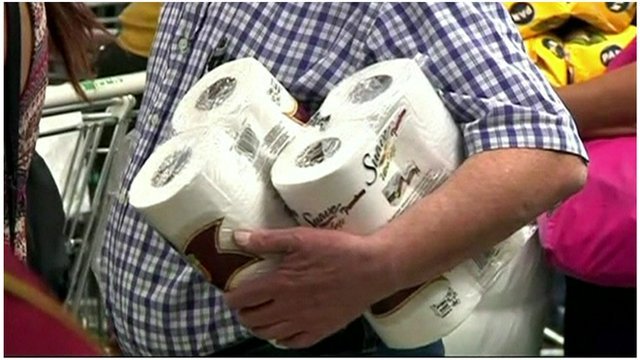
Venezuela’s National Assembly has backed the country’s plans to import 39 million rolls of toilet paper, in an effort to relieve a chronic shortage
Nicolas Maduro has vowed to uphold the legacy of his late predecessor, Hugo Chavez, whose “21st-Century socialism” involved sweeping nationalization and extensive social programmes.
Analysts say that the government’s attempts to impose state control on the economy have created huge imbalances that have led to the shortages.
“Price controls, for example, act as a disincentive to local producers, forcing them to cut output,” says the survey organization Consensus Economics.
“The resulting scarcity forces up inflation, defeating the entire purpose of price controls in the first place.”
Venezuela’s inflation is the highest in Latin America and is currently running at about 25%.
The Venezuelan currency, bolivar, has been devalued repeatedly in recent years, most recently by 32% in February.
[youtube RZoRUN-flQ8]
[youtube WW2aBNSDfJE]
Several opposition MP’s are reportedly being injured during a brawl that have broken out in Venezuela’s parliament over the recent disputed presidential election.
Several legislators were left bloodied and bruised, with both opposition and pro-government lawmakers accusing each other of starting the fight.
A measure was earlier passed denying MPs the right to speak until they recognized Nicolas Maduro as president.
Official results show he narrowly beat opposition candidate Henrique Capriles Radonski, who has demanded a full recount.
The National Electoral Council (CNE) – which has rejected Henrique Capriles’ demand – on Monday said Nicolas Maduro had won by 1.49 percentage points, or fewer than 225,000 votes.
This came after the council had amended the final result, taking into account votes cast abroad.
In all, 99.79% of the votes have now been counted.
Earlier figures had shown a 1.8 percentage victory for Nicolas Maduro, who stood in the poll as the chosen successor of the late President Hugo Chavez.
On Tuesday, the opposition said a number of its lawmakers were attacked and hurt in the parliament – the National Assembly.
One of the MPs, Julio Borges, later appeared on a local TV station with facial bruises.
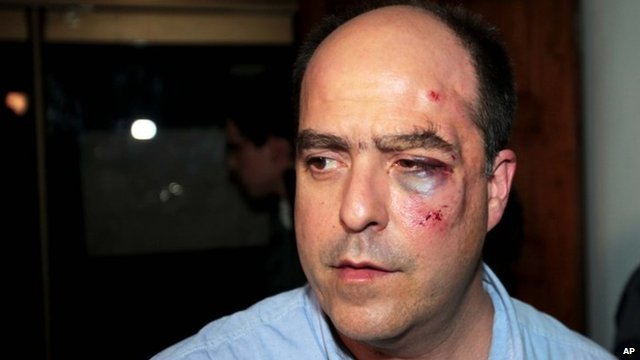
Opposition deputy Julio Borges appeared on a local TV station with facial bruises after Venezuela’s parliament brawl
“They can beat us, jail us, kill us, but we will not sell out our principles,” Julio Borges was quoted as saying.
“These blows give us more strength.”
The opposition said it was being “silenced” by National Assembly President Diosdado Cabello.
“I am going to ask you: Mr. Deputy, do you recognize Nicolas Maduro?” Diosdado Cabello asked one of them. “If you say no, you don’t get to speak in the assembly.”
Pro-government representatives blamed the opposition for starting the clashes.
“Today again I had to defend [Hugo Chavez’s] legacy,” lawmaker Odalis Monzon was quoted as saying by Reuters.
She added that she and several of her colleagues were attacked and beaten during the fighting.
The CNE declared President Nicolas Maduro the winner on April 15, after he had gained what it called an “irreversible majority”. He was sworn in as Venezuela’s president on April 19.
Henrique Capriles has demanded a vote-by-vote recount, but the CNE said it would be legally impossible to carry out.
It has, however, agreed to carry out a partial audit, which is expected to take until June. During the audit, 56% of the votes cast will be examined.
The CNE says the remaining 44% had been checked immediately after the election.
On Monday, Henrique Capriles said Nicolas Maduro had “illegitimately stolen the presidency”,
He has until May 6 to lodge his request with the Supreme Court contesting the election result.
Henrique Capriles said he had “no doubt that this will end up before an international body”.
Both Henrique Capriles and Nicolas Maduro have urged their supporters to turn out for separate demonstrations on May 1st, sparking fears the two camps could clash.
Nicolas Maduro on Monday said he had changed the route of his march because he “did not want problems”.
But the opposition says it continues to be targeted by the government, citing the arrest on Saturday of retired General Antonio Rivero as proof.
The opposition politician has been charged with criminal instigation and criminal association, after prosecutors blamed him for outbreaks of post-election violence.
Relatives of General Antonio Rivero say he is on a hunger strike in protest.
[youtube C7Wk82dHA6E]
Venezuela’s electoral council has amended the final result of the April 14 presidential election for Hugo Chavez’s successor after finishing counting votes cast abroad.
The council said that according to its latest figures, Nicolas Maduro won the election by 1.49 percentage points, or fewer than 225,000 votes.
Earlier official figures had suggested Nicolas Maduro won by 1.8 percentage points.
Opposition candidate Henrique Capriles Radonski has demanded a full recount, which the council has rejected.
Figures released by the National Electoral Council (CNE) on Monday revealed that Henrique Capriles had won 93.13% of the votes cast abroad.
With 99.79% of the votes counted, the margin between the two candidates had narrowed to 1.49 percentage points, it said.

Nicolas Maduro won Venezuela’s election by 1.49 percentage points, or fewer than 225,000 votes
The CNE declared President Nicolas Maduro the winner on April 15, after he had gained what it called an “irreversible majority”. He was sworn in on April 19.
Henrique Capriles has demanded a vote-by-vote recount, but the CNE said it would be legally impossible to carry out.
It has, however, agreed to carry out a partial audit, which is expected to take until June. During the audit, 56% of the votes cast will be examined.
The CNE says the remaining 44% had been checked immediately after the election.
On Monday, Henrique Capriles said Nicolas Maduro had “illegitimately stolen the presidency”.
He has until May 6 to lodge his request with the Supreme Court contesting the election result.
Henrique Capriles said he had “no doubt that this will end up before an international body”.
Supporters and opponents of Nicolas Maduro have also been clashing in Venezuela’s parliament, the National Assembly.
Opposition politicians have complained about being “silenced” by National Assembly President Diosdado Cabello.
“I am going to ask you: Mr. Deputy, do you recognize Nicolas Maduro?” Diosdado Cabello asked one of them.
“If you say no, you don’t get to speak in the assembly.”
Both Henrique Capriles and Nicolas Maduro have urged their supporters to turn out for separate demonstrations on May 1st, sparking fears the two camps could clash.
On Monday, Nicolas Maduro said he had changed the route of his march because he “did not want problems”.
But the opposition says it continues to be targeted by the government, citing the arrest on Saturday of retired General Antonio Rivero as proof.
The opposition politician has been charged with criminal instigation and criminal association, after prosecutors blamed him for outbreaks of post-election violence.
Relatives of General Antonio Rivero says he is on a hunger strike in protest.
Henrique Capriles, the opposition candidate for Venezuela’s presidency, has threatened to take action over disputed votes he claims were “stolen” by Nicolas Maduro’s government.
Henrique Capriles Radonski demanded details of an audit of the vote the electoral council says it will carry out.
He said the council had a “deadline” of Thursday, but did not specify what action he would take.
Nicolas Maduro won the April 14 election by less than two percentage points.
He was sworn in as president last week, succeeding his mentor Hugo Chavez, who died in March of cancer.
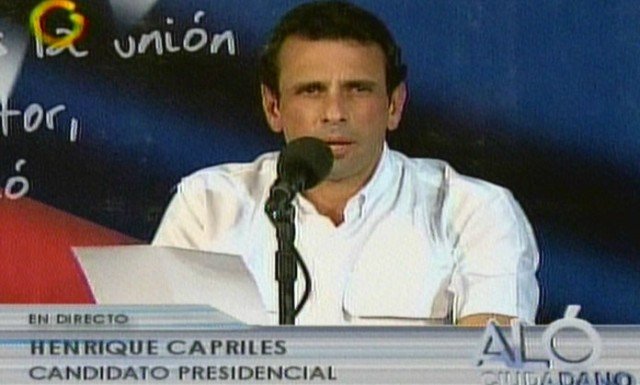
Henrique Capriles has threatened to take action over disputed votes he claims were “stolen” by Nicolas Maduro’s government
But the opposition cried foul, and tensions in the divided country have reached fever pitch, with the government accusing the opposition of fomenting coup attempts and the opposition accusing the government of “desperate lies”.
Nine people died in post-election protests and both the government and opposition are planning more protests on 1st of May.
Henrique Capriles says the vote was marred by thousands of irregularities, including voter intimidation, and has demanded a full recount.
The national electoral council (CNE) offered an electronic audit of the vote last week, to begin this week, but says Nicolas Maduro’s victory remains “irreversible”.
It has so far failed to give any details of the audit and on Wednesday Henrique Capriles said he would wait only until Thursday.
“We will not accept a joke audit,” Henrique Capriles said at a news conference.
“It’s time to get serious.”
Henrique Capriles repeated his accusations that Nicolas Maduro had manipulated poll results, telling a news conference: “The truth – and it is as big as our country is wide – is that you stole the election. That is the truth.
“You stole this electoral process, and you have to explain that to this country and to the world.”
The government, meanwhile, accuses the opposition of stirring up the post-election violence in a bid to engender a coup, and the government-controlled National Assembly has now announced a commission to investigate whether Henrique Capriles was responsible.
Pedro Carreno, who will head the commission, dubbed Henrique Capriles a “murderer” as he announced its formation – joining the National Assembly head Diosdado Cabello, who has called him a “fascist murderer”.
Prisons Minister Iris Varela, meanwhile, has said a jail cell awaits Henrique Capriles.
Media coverage of the post-election violence has been at odds, with state media describing pro-opposition mobs torching health clinics but opposition media saying many reports of the violence were fabricated.
[youtube JLppZPzN604]
Nicolas Maduro has been sworn in as Venezuela’s new president, succeeding the late Hugo Chavez who died of cancer last month.
Thousands gathered on the streets of Caracas to show their support for Nicolas Maduro and to celebrate independence.
The inauguration ceremony follows a decision by the electoral body to carry out a full audit on all of the votes cast in Sunday’s disputed presidential poll.
Nicolas Maduro beat opposition leader Henrique Capriles Radonski by 1.5% of the vote.
Henrique Capriles, who believed there were voting irregularities, says he accepts the electoral audit.
Opposition supporters were expected to protest against Nicolas Maduro’s inauguration by banging on pots and pans, and playing salsa music.

Nicolas Maduro has been sworn in as Venezuela’s new president, succeeding the late Hugo Chavez who died of cancer last month
Dozens of leaders from across the region (including Brazil, Cuba and Colombia), Iran and some Arab countries attended the ceremony.
Henrique Capriles made an appeal for peaceful protests in a bid to avoid further violence after clashes left seven people dead on Monday.
The National Electoral Council’s decision to audit all the paper receipts of electronic votes is seen as a major concession to the opposition.
The council had earlier audited 54% of the vote and said this showed that Nicolas Maduro, the chosen successor of the late President Hugo Chavez, had won a slim majority.
The official count indicates Nicolas Maduro won 50.8% of votes to Henrique Capriles’s 49.0%.
Henrique Capriles said he believed the crucial votes that cost him the presidency are among the unaudited 46% of the vote.
He said there were more than 3,000 incidents from Sunday’s poll that needed to be examined.
Correspondents say the announcement comes as a surprise to many after the electoral body initially said the results, which it announced on Sunday night, were “irreversible”.
The council’s president, Tibisay Lucena, told AFP news agency that the expanded audit was not a recount but would cover all ballot boxes not audited on election day by reviewing a sample two-thirds of them over the next month.
Venezuela uses electronic voting machines which register an elector’s decision and then emit a printed receipt for the voter to deposit into a sealed ballot box. For the audit, the receipts will be compared with the electronic tallies, to check for any irregularities.
Russian President Vladimir Putin and Cuban leader Raul Castro were among the first heads of state to congratulate Nicolas Maduro on his win.
The governments of Brazil, Peru, Ecuador, Colombia, Bolivia and Argentina, among others, have also voiced their backing for Nicolas Maduro’s victory.
But the US has so far refused to recognize Nicolas Maduro’s win, calling for an audit of the results.
Secretary of State John Kerry said the US was not yet ready to validate the results of Sunday’s poll.
Several opposition-led protests erupted across the country after the official results were announced on Sunday.
[youtube 1ONcmUSe5Wc]
Nicolas Maduro has been formally proclaimed by Venezuela’s election authority as the winner of Sunday’s closely-fought presidential election.
The National Electoral Council backed the slender victory of Nicolas Maduro, the acting president, despite protests from opposition candidate Henrique Capriles.
The official count indicates Nicolas Maduro won 50.7% of votes to Henrique Capriles’ 49.1%.
Following the announcement, clashes broke out between protesters and police in the capital Caracas.
Police fired tear gas at hundreds of students demonstrating in one part of the city, while elsewhere opposition supporters took to their balconies and the streets to bang pots and pans in protest.
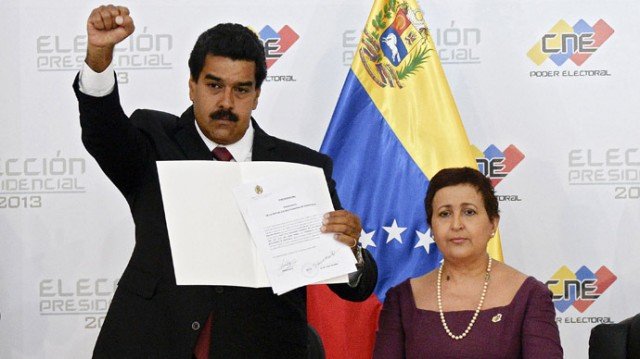
Nicolas Maduro has been formally proclaimed by Venezuela’s election authority as the winner of Sunday’s closely-fought presidential election
Henrique Capriles had earlier urged national protests and a march on the electoral offices in the capital in the event that Nicolas Maduro was declared the winner.
He called on the National Electoral Council not to confirm the election result, citing voting irregularities, and demanded a recount.
Henrique Capriles said he regarded the election of Nicolas Maduro as “illegitimate”.
The poll was called after President Hugo Chavez died of cancer last month.
Nicolas Maduro is a former bus driver who rose to become Hugo Chavez’s vice-president and heir apparent.
Henrique Capriles said there were more than 3,200 “incidents” from Sunday’s poll that needed to be examined.
“All we’re asking is that our rights be respected, that the will of the people be respected, and that every single vote be counted, every little piece of paper,” he told a news conference broadcast on national television.
But while it has agreed to an audit of the electronic counting system, the government is rejecting calls that the ballot boxes be opened for a manual recount.
Monday saw opposition students briefly invade a hotel where international election observers are staying, demanding to know why the vote had been declared free and fair.
Russian President Vladimir Putin and Cuban leader Raul Castro were among the first heads of state to congratulate Nicolas Maduro on his win.
But the US has called for an audit of the results.
[youtube 1KLzUawXY_I]
Henrique Capriles Radonski, the defeated Venezuelan presidential candidate, has demanded a recount of votes, rejecting the election of Hugo Chavez’s successor as “illegitimate”.
Henrique Capriles, 40, said there were more than 300,000 incidents from Sunday’s poll that needed to be examined.
However, the electoral authorities said Socialist Nicolas Maduro would be confirmed as the winner.
Nicolas Maduro has called for the results to be respected.
The National Electoral Council is due to formally proclaim Nicolas Maduro’s victory at a ceremony and rally in Caracas later on Monday.
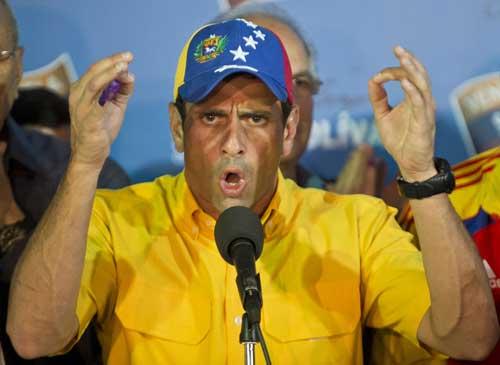
Henrique Capriles Radonski, the defeated Venezuelan presidential candidate, has demanded a recount of votes, rejecting the election of Nicolas Maduro
The election was called after Hugo Chavez’s death from cancer last month.
Nicolas Maduro, a former bus driver whom Hugo Chavez had named as his preferred heir, won 50.7% of the vote against 49.1% for Henrique Capriles.
The National Electoral Council said the results, which it announced on Sunday night, were “irreversible”.
Russian President Vladimir Putin and Cuban leader Raul Castro were among the first heads of state to congratulate Nicolas Maduro on his win.
Meanwhile the US has called for an audit of the results.
“This appears an important, prudent and necessary step to ensure that all Venezuelans have confidence in these results,” a White House spokesman said.
As the news of Nicolas Maduro’s victory emerged, celebrations erupted in the capital, Caracas.
Thousands of jubilant supporters took to the streets, dancing, singing and blasting car horns, while fireworks lit up the night sky. Opposition voters banged pots and pans in protest.
Speaking outside the presidential palace, Nicolas Maduro told crowds that the result was “just, legal and constitutional”.
He said his election showed Hugo Chavez “continues to be invincible, that he continues to win battles”.
Nicolas Maduro, who was wearing a tracksuit top in the colors of the Venezuelan flag, said he had spoken to Henrique Capriles on the phone, and that he would allow an audit of the election result.
He called for those who had not voted for him to “work together” for the country.
Nicolas Maduro’s margin of victory was far narrower than that achieved by Chavez at elections last October, when he beat Henrique Capriles by more than 10 percentage points.
Almost immediately, one member of the National Electoral Council who does not have government sympathies called on the authorities to carry out a recount by hand, a call later echoed by Henrique Capriles himself.
[youtube NPdKOex1Y_Q]
Socialist Nicolas Maduro has won a narrow victory in Venezuela’s presidential being officially elected as the successor of the late leader Hugo Chavez.
Nicolas Maduro won 50.7% of the vote against 49.1% for opposition candidate Henrique Capriles Radonski.
Henrique Capriles has demanded a recount, saying Nicolas Maduro was now “even more loaded with illegitimacy”.
The opposition candidate said there were more than 300,000 incidents from Sunday’s poll that would need to be examined.
The electoral commission said the results were “irreversible”.
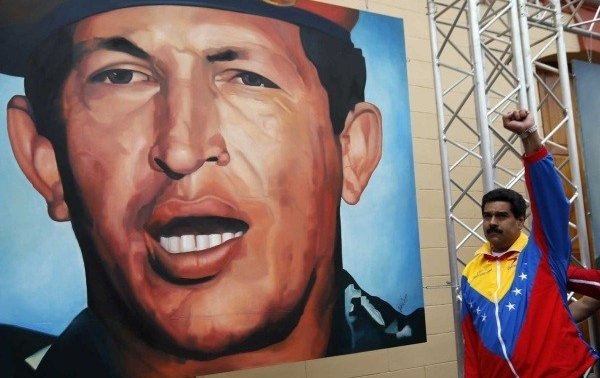
Socialist Nicolas Maduro has won a narrow victory in Venezuela’s presidential being officially elected as the successor of the late leader Hugo Chavez
When the results were announced at 23:15 local time, celebrations erupted in the capital, Caracas, where Nicolas Maduro’s jubilant supporters set off fireworks and blasted car horns. Opposition voters banged pots and pans in protest.
In a victory speech outside the presidential palace, Nicolas Maduro, wearing the colors of the Venezuelan flag, told crowds that the result was “just, legal and constitutional”.
He said his election showed Hugo Chavez “continues to be invincible, that he continues to win battles”.
Nicolas Maduro said he had spoken to Henrique Capriles on the phone, and that he would allow an audit of the election result.
The former Venezuela’s vice president, who was hand-picked by Hugo Chavez as his successor, called for those who had not voted for him to “work together” for the country.
However, Nicolas Maduro’s margin of victory was far narrower than that achieved by Hugo Chavez at elections last October, when he beat Henrique Capriles by more than 10%.
At Henrique Capriles’ campaign headquarters the mood was sombre, as his supporters watched the results on television. Some cried, while others hung their heads in dismay.
Shortly afterwards, Henrique Capriles emerged, angry and defiant.
“It is the government that has been defeated,” he said.
Then, addressing Nicolas Maduro directly, Henrique Capriles said: “The biggest loser today is you. The people don’t love you.”
Nicolas Maduro had been serving as acting president since Hugo Chavez died of an unknown type of cancer on March 5.
He is due to be sworn in on April 19 and serve until January 2019 to complete the six-year term that Hugo Chavez would have begun in January.
Hugo Chavez was a divisive leader. To his supporters he was the reforming president whose idiosyncratic brand of socialism defeated the political elite and gave hope to the poorest Venezuelans.
He effectively used his country’s vast oil reserves to boost Venezuela’s international clout, and his strident criticism of the US won him many political allies in Latin America.
However, Hugo Chavez’s political opponents accused him of being an autocrat, intent on building a one-party state.
Hugo Chavez bequeaths a nation beset by crumbling infrastructure, unsustainable public spending and under-performing industry.
[youtube 8OegEI2JnGY]
Venezuela is voting in new presidential election, called after the death of Hugo Chavez last month.
Venezuela’s Acting President Nicolas Maduro, chosen by Hugo Chavez as his successor, is running against Henrique Capriles Radonski, currently governor of Miranda state.
Henrique Capriles narrowly lost to Hugo Chavez in elections last October.
On the eve of polls opening, he accused Nicolas Maduro of breaking election laws by continuing its campaign on state television.
Electoral authorities say voting has been going smoothly. Security had been stepped up for the vote.
Nicolas Maduro, 50, whose campaign has focused on his close relationship to Hugo Chavez, was shown visiting the tomb of the late leader, a move Henrique Capriles, 40, said was “violating all the electoral norms”.
Both candidates have to some extent broken the media silence they are supposed to have maintained since campaigning officially ended on Thursday.
Almost 19 million Venezuelans have the right to vote in the poll.
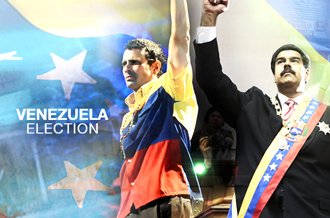
Venezuela’s Acting President Nicolas Maduro, chosen by Hugo Chavez as his successor, is running against Henrique Capriles Radonski, currently governor of Miranda state
Nicolas Maduro cast his vote in the Catia area of the capital Caracas, accompanied by Hugo Chavez’s two daughters. Henrique Capriles voted in the Las Mercedes district of the capital.
Hundreds of election monitors are present from different countries and international organizations to ensure the poll is free and fair.
The vote is electronic – one machine will identify voters’ fingerprints, and a second will recognize identity card numbers and register the vote anonymously.
Polls will stay open until all those queuing at closing time have voted.
Official results are expected about three hours after the polls close.
Both presidential candidates wrote on Twitter early in the morning.
Nicolas Maduro invited Venezuelans to vote to guarantee the future and the perpetual peace of their country.
Meanwhile opposition candidate Henrique Capriles said: “The big day is here!” and used a hashtag urging people to “vote without fear”.
Former President Hugo Chavez died on March 5, after a two-year battle against an undisclosed type of cancer, prompting a short electoral campaign period before Sunday’s elections.
The winner is due to be sworn in on April 19 and serve until January 2019, to complete the six-year term that Hugo Chavez was supposed to have begun in January.
Hugo Chavez was a divisive leader. To his supporters he was the reforming president whose idiosyncratic brand of socialism defeated the political elite and gave hope to the poorest Venezuelans.
He effectively used his country’s vast oil reserves to boost Venezuela’s international clout, and his strident criticism of the US won him many political allies in Latin America.
However, Hugo Chavez’s political opponents accuse him of being an autocrat, intent on building a one-party state.
Hugo Chavez bequeaths a nation beset by crumbling infrastructure, unsustainable public spending and under-performing industry.
His handpicked candidate Nicolas Maduro is seen as the front-runner, but recent polls suggested the gap between him and his rival was narrowing.
Nicolas Maduro:
- Named by Hugo Chavez as preferred successor; currently Venezuela’s acting president
- Served as vice-president and foreign minister under Hugo Chavez
- Former bus driver, lifelong socialist and trade unionist
Henrique Capriles Radonski:
- Trained as a lawyer, currently governor of state of Miranda
- Gained 44% of vote against Hugo Chavez in 2012 elections
- Describes policies as “centrist” and cites former Brazilian President Luiz Inacio Lula da Silva as inspiration
[youtube Fj_xbejad4U]
Members of the Venezuelan opposition have made an official complaint against the government following allegations that it broke the law by continuing its electoral campaign on state television.
Venezuela’s acting President Nicolas Maduro appeared on TV visiting the tomb of Hugo Chavez on the eve of the election.
The opposition candidate Henrique Capriles said his opponent was “violating all the electoral norms”.
On Saturday, he launched an internet channel to broadcast his own campaign.
Despite this, Henrique Capriles said he had been “respecting the electoral rules, but those in power don’t know anything other than the abuse of power”.
Almost 19 million Venezuelans will have the right to vote on Sunday for a successor to Hugo Chavez.
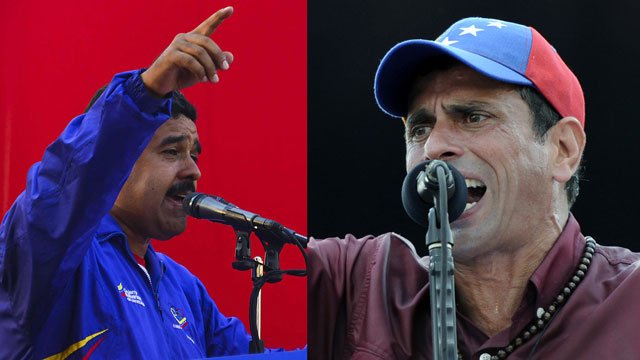
Henrique Capriles has made an official complaint against Venezuela’s Acting President Nicolas Maduro for breaking the electoral law
Voting will be electronic – one machine will identify voters’ fingerprints, and a second will recognize identity card numbers and register the vote anonymously.
Polls will open at 06:30 local time and close 10 hours later, although they will stay open until all those queuing at closing time have voted.
Venezuela’s President Hugo Chavez died on March 5, after a two-year long battle against an undisclosed type of cancer, prompting a short electoral campaign period before Sunday’s elections.
The winner is due to be sworn in on April 19 and serve until January 2019, to complete the six-year term that Hugo Chavez would have begun in January.
Hugo Chavez’s handpicked candidate Nicolas Maduro is seen as the front-runner, but recent polls said the gap between him and his rival, Henrique Capriles, was narrowing.
Both sides staged massive rallies to mark the official end of their campaigns on Thursday.
But since 2002, Hugo Chavez’ supporters have staged celebrations on April 13, the date when the late leader returned to power after a brief coup in 2002.
Venezuelan state television showed Nicolas Maduro visiting the tomb of the late leader, accompanied by the Argentine football star Diego Maradona, who also took part in Maduro’s final rally on Thursday.
“Let’s honor his [Hugo Chavez’s] memory, his legacy,” Nicolas Maduro told Venezuelans in a speech at the tomb.
An interview with the acting president about the short-lived 2002 coup was also broadcast.
On Friday, members of the opposition campaign said they had lodged an official complaint with the Electoral Commission.
Henrique Capriles also complained on Twitter, saying VTV was “shamelessly breaking the electoral rules”.
For his part, Nicolas Maduro said on the micro-blogging site that there was an alleged “dirty war” being plotted against him from Colombia’s capital, Bogota.
[youtube jk2fFI3QG_k]
Venezuelan opposition leader Henrique Capriles has confirmed that he will stand in presidential elections on April 14.
In a televised address, Henrique Capriles accused the governing PSUV party of manipulating the recent death of President Hugo Chavez.
Hugo Chavez died on March 5 after a two-year battle against cancer.
Henrique Capriles will stand against Acting President Nicolas Maduro, whom Hugo Chavez named as his favored successor.
Nicolas Maduro went on state television minutes after the opposition leader’s appearance, accusing him of being a “fascist”.
Correspondents say the stage is now set for a bitter presidential campaign.
The opposition boycotted Nicolas Maduro’s swearing-in on Friday, claiming that – under the constitution – the speaker of the National Assembly, Diosdado Cabello, should be the one to take over as acting president.
Henrique Capriles – candidate for the umbrella opposition group Table for Democratic Unity (MUD) – called the move fraudulent.
On Sunday, he again accused the socialist PSUV of violating the constitution.
“My fight is not to be president, my fight is for Venezuela to move forward,” he said.
“You [the PSUV] are the ones who became sick by power. You fear losing it.”
Henrique Capriles added: “I am going to fight. Nicolas, I am not going to give you a free pass. You will have to beat me with votes.”
Henrique Capriles, 40, is a lawyer by training and governor of the state of Miranda. He describes his policies as “centrist” and “humanist”.

Venezuelan opposition leader Henrique Capriles has confirmed that he will stand in presidential elections on April 14
In his televised address on Sunday, Nicolas Maduro accused Henrique Capriles of inciting hatred, and said he was trying to provoke violence by insulting the late president’s image.
“You have made the biggest mistake of your life,” he said.
Nicolas Maduro announced that he would ask the national assembly to change the constitution on Tuesday to allow Hugo Chavez’s body to lie beside that of 19th Century South American revolutionary leader Simon Bolivar.
Both Nicolas Maduro and his opposition rival must register their candidacies by Monday.
Hugo Chavez – who led Venezuela for 14 years – won last October’s election against Henrique Capriles, polling 54% of the vote to Capriles’s 44%.
Hugo Chavez named his 50-year-old vice-president and foreign minister as his preferred successor following the recurrence of cancer.
Nicolas Maduro’s friendship with Hugo Chavez dates back to when the former president served time in prison for an attempted coup in 1992.
The former bus driver campaigned for Hugo Chavez to be released – which happened two years later.
He has vowed to carry on where the late leader left off but acknowledged that Hugo Chavez would be difficult to follow.
Nicolas Maduro told a crowd on Saturday: “I am not Chavez – speaking in terms of the intelligence, charisma, historical force, leadership capacity and spiritual grandeur of our comandante [commander].”
Hugo Chavez’s body is still lying in state at a military academy in the capital Caracas. Millions of Venezuelans have filed past to pay their respects.
Nicolas Maduro says the former leader’s body will be embalmed “like Lenin and Mao Zedong”.
[youtube NqlOdbgZluY]
Venezuela’s presidential election to replace late leader Hugo Chavez will be held on April 14, the country’s electoral commission has said.
The announcement follows the appointment of Hugo Chavez’s favored successor, Nicolas Maduro, as acting president.
Hugo Chavez died on March 5 after a long battle with cancer.
Nicolas Maduro will run as the governing party candidate with Henrique Capriles expected to stand for the opposition.
Hugo Chavez – who led Venezuela for 14 years – won last October’s election against Henrique Capriles, polling 54% of the vote to Capriles’s 44%.
As Hugo Chavez’s health worsened, he announced that his vice-president, Nicolas Maduro, should succeed him.
Nicolas Maduro, 50, has pledged to carry on the former president’s leftist policies and opinion polls have shown him as the favorite to win the next election.
The head of the electoral commission, Tibisay Lucena, said the candidates would have to register for the race by Monday.
Shortly after his announcement, the head of the opposition coalition officially proposed Henrique Capriles, 40, as their presidential candidate.

Nicolas Maduro will run as the governing party candidate with Henrique Capriles expected to stand for the opposition
Henrique Capriles tweeted that he was grateful to be chosen, adding that he was analyzing the statement from the electoral commission.
“In the following hours I will give my decision,” he said.
Henrique Capriles – a lawyer by training – is governor of the state of Miranda.
He describes his policies as “centrist” and “humanist” and says his political inspiration is former Brazilian President Luiz Inacio Lula da Silva who courted businesses and investors while also developing social programmes.
Despite the outpouring of grief and affection for Hugo Chavez, whose lavish state funeral was held on Friday, the opposition believe they have a chance of winning the election.
Millions of Venezuelans have filed past his coffin as it continues to lie in state in a military museum in Caracas.
Nicolas Maduro has announced that the former leader’s body will be embalmed “like Lenin and Mao Zedong”.
The opposition boycotted Nicolas Maduro’s swearing-in on Friday, saying that it was unconstitutional.
It argued that – under the constitution – the speaker of the National Assembly, Diosdado Cabello, should be the one to take over as acting president.
Henrique Capriles called the move fraudulent.
The opposition further argues that, according to the constitution, the election should be held within 30 days of Hugo Chavez’s death. The date picked falls outside that period.
Meanwhile, Acting President Nicolas Maduro held one of his first diplomatic appointments on Saturday when he had a private meeting with the Chinese delegation that attended Friday’s state funeral.
He told the Chinese representatives that Beijing “can count with the Bolivarian government, with the people of Venezuela to deepen the strategic alliance that our two countries have”.
Nicolas Maduro and Nicaraguan President Daniel Ortega later visited the military academy where Hugo Chavez is lying in state.
Vice-president Nicolas Maduro has been sworn in as acting president of Venezuela hours after the state funeral of Hugo Chavez.
The ceremony was led by National Assembly Speaker Diosdado Cabello in the capital, Caracas.
Hugo Chavez, who died on March 5 after a long battle with cancer, had named Nicolas Maduro as his chosen successor.
However, the main opposition coalition boycotted Nicolas Maduro’s swearing-in, saying that it was unconstitutional.
It argues that – under the constitution – the speaker of the National Assembly should be the one to take over as acting president.
The opposition leader, Henrique Capriles, called the move fraudulent.
After swearing in Nicolas Maduro, Diosdados Cabello said: “Venezuela will follow the route to socialism.”
As acting president, Nicolas Maduro is expected to call elections within 30 days.
Holding a copy of the Venezuelan constitution in his hand, Nicolas Maduro announced at the National Assembly: “I swear in the name of absolute loyalty to Comandante [commander] Hugo Chavez that we will obey and defend this Bolivarian Constitution with the hard hand of the free people.”

Vice-president Nicolas Maduro has been sworn in as acting president of Venezuela hours after the state funeral of Hugo Chavez
Fireworks exploded above Caracas as Nicolas Maduro was sworn in.
Earlier on Friday, Venezuelans paid an emotional farewell to Hugo Chavez.
Nicolas Maduro told mourners that Hugo Chavez, who led Venezuela for 14 years, remained “undefeated, pure, living for all time”.
The former vice-president began the funeral ceremony by presenting Hugo Chavez’s coffin with the sword of Simon Bolivar – the 19th-Century independence leader he claimed as his inspiration.
More than 30 world leaders attended the ceremony, including Cuban President Raul Castro, Iran’s Mahmoud Ahmadinejad and Alexander Lukashenko of Belarus.
A message was read out from Syrian President Bashar al-Assad.
Hugo Chavez, 58, was re-elected for a fourth term as president last October after saying he had recovered from his illness.
He named Nicolas Maduro as his preferred successor following the recurrence of his cancer.
Nicolas Maduro:
- Born in Caracas in 1962
- Former bus driver who began political career as a trade unionist
- Campaigned for Hugo Chavez’s release from prison in 1994
- Speaker of the National Assembly from 2005-2006
- 2006 becomes foreign minister
- 2012 appointed vice-president
- Has long-standing ties with Cuba where he trained as a union organizer
- Described as a wily operator and a skilled negotiator
[youtube Dj2yGhE-ZuA]
[youtube Eh_lYi-91_o]
Leaders from Latin America and beyond are gathering in Caracas for the state funeral of Venezuela’s President Hugo Chavez.
After the funeral, Hugo Chavez’s body will be taken to a military museum to lie in state for another seven days.
More than two million mourners have already filed past his body at a military academy.
Hugo Chavez’s body is to be embalmed and placed on permanent display, Vice-President Nicolas Maduro says.
Later on Friday, Nicolas Maduro is due to be sworn in as acting president. As such, he must call elections within 30 days.
Hugo Chavez, who led Venezuela for 14 years, died on Tuesday aged 58 after a long battle with cancer.
More than 30 heads of state are expected to attend Friday’s funeral including Iranian President Mahmoud Ahmadinejad, Cuban President Raul Castro and Belarussian leader Alexander Lukashenko.
Mahmoud Ahmadinejad has praised Hugo Chavez as a “martyr” and a “wise and revolutionary leader”.

Leaders from Latin America and beyond are gathering in Caracas for the state funeral of Venezuela’s President Hugo Chavez
Meanwhile, President Sebastian Pinera of Chile arrived at Simon Bolivar airport in Caracas early on Friday, telling reporters that the thoughts of Chile were with Venezuela at a difficult time.
US Congressman Gregory Meeks and former Congressman William Delahunt will represent the United States at the funeral of Hugo Chavez, a fierce critic of Washington.
Nicolas Maduro said that Hugo Chavez’s body would be embalmed “like Lenin and Mao Zedong”, and put on display for at least another seven days.
The body will be moved to the Caracas military museum where in 1992 Hugo Chavez – as an army officer – was captured after leading a failed coup.
Nicolas Maduro said the building would be converted into a new “museum of the revolution”.
Hugo Chavez’s supporters want him eventually interred in Venezuela’s national Pantheon alongside Simon Bolivar, the 19th Century independence leader the late president claimed as his political inspiration.
However, Venezuela’s constitution says people can only be admitted to the Pantheon 25 years after their death.
Hugo Chavez named Nicolas Maduro as his preferred successor following the recurrence of his cancer.
[youtube piuVL-kJNEw]
[youtube 5oY8GAyGeio]
Hugo Chavez’s body is to be embalmed and put on display after his funeral, Venezuela’s Vice-President Nicolas Maduro says.
The decision reflects the huge crowds queuing to pay their respects in Caracas, where he is lying in state.
Hugo Chavez’s body will be moved to a military museum after the state funeral on Friday, Nicolas Maduro said.
Hugo Chavez, who led Venezuela for 14 years, died on Tuesday after a long battle with cancer.
More than two million mourners have already filed past his body at the military academy in Caracas, queuing for hours to see him lying in state.
Leaders from Latin America and beyond are gathering in Caracas for his funeral on Friday, and Nicolas Maduro said the ceremony would go ahead as planned.
His body would be embalmed “like Lenin and Mao Zedong”, and put on display for at least another seven days, Nicolas Maduro added.
The body will be moved to the Caracas military museum, where Hugo Chavez – then an army officer – was captured in 1992 after leading the failed coup attempt that first brought him onto Venezuela’s political stage.
The building will be converted into a new “museum of the revolution”, Nicolas Maduro said.

Hugo Chavez’s body is to be embalmed and put on display after his funeral
Hugo Chavez’s supporters want him eventually interred in Venezuela’s national Pantheon alongside Simon Bolivar, the 19th Century independence leader the late president claimed as his political inspiration.
But Venezuela’s constitution says people can only be admitted to the Pantheon 25 years after their death.
The Venezuelan government says more than 30 world leaders – mostly from Latin America and the Caribbean – will attend the funeral on Friday morning.
Among them will be President Dilma Rousseff of Brazil and Mahmoud Ahmadinejad of Iran.
Hugo Chavez died on Tuesday after a two-year battle with cancer that saw him have four operations in Cuba.
[youtube NnwomEwJthk]
[youtube oyTag4vCXj0]
Thousands of Venezuelans have come out onto the streets of Caracas to pay tribute to President Hugo Chavez, who died on Tuesday.
Hugo Chavez’s coffin set off in a procession to the Military Academy, where he will lie in state till Friday.
The government has announced seven days of mourning for President Hugo Chavez, who died aged 58 after 14 years in the post.
Hugo Chavez, a controversial figure and staunch critic of the US, was seriously ill with cancer for more than a year.
A self-proclaimed revolutionary, he inspired a left-wing revival across Latin America.
Latin American leaders have begun arriving in Caracas to pay their respects – among them President Cristina Fernandez de Kirchner of Argentina, Jose Mujica of Uruguay and Evo Morales of Bolivia.
Ecuador, Argentina, Brazil, Bolivia, Uruguay, Chile, Cuba and the Caribbean island of Dominica have declared periods of official mourning.

Hugo Chavez’s coffin set off in a procession to the Military Academy, where he will lie in state till Friday
Another Hugo Chavez ally, Iranian President Mahmoud Ahmadinejad, also announced a day of mourning, describing him as a “martyr”.
Military units across the country have fired a 21-gun salute in his honor. They will fire another cannon shot each hour until he is buried, the armed forces said.
All schools and universities have been shut for the week.
On Wednesday morning, a priest prayed for eternal rest for Hugo Chavez in a brief ceremony at the hospital where he died on Tuesday.
Officials then put the flag-draped coffin on top of a waiting hearse surrounded by crowds.
The procession began its slow journey through the streets of the city, led by officials including Vice-President Nicolas Maduro and accompanied by cheering red-clad supporters.
Some shouted “Chavez to the pantheon”, referring to the mausoleum he built for revolutionary leader Simon Bolivar.
[youtube qIcCVKTlAbM]
 Prev1...567Next
Prev1...567Next  Page 6 of 7
Page 6 of 7

























